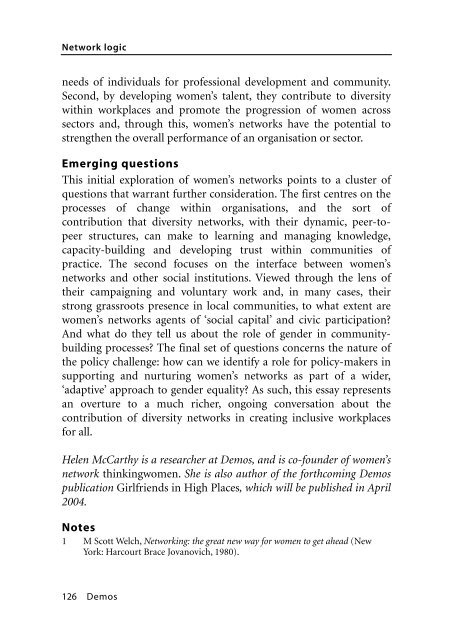Network Logic - Index of
Network Logic - Index of
Network Logic - Index of
You also want an ePaper? Increase the reach of your titles
YUMPU automatically turns print PDFs into web optimized ePapers that Google loves.
<strong>Network</strong> logic<br />
needs <strong>of</strong> individuals for pr<strong>of</strong>essional development and community.<br />
Second, by developing women’s talent, they contribute to diversity<br />
within workplaces and promote the progression <strong>of</strong> women across<br />
sectors and, through this, women’s networks have the potential to<br />
strengthen the overall performance <strong>of</strong> an organisation or sector.<br />
Emerging questions<br />
This initial exploration <strong>of</strong> women’s networks points to a cluster <strong>of</strong><br />
questions that warrant further consideration. The first centres on the<br />
processes <strong>of</strong> change within organisations, and the sort <strong>of</strong><br />
contribution that diversity networks, with their dynamic, peer-topeer<br />
structures, can make to learning and managing knowledge,<br />
capacity-building and developing trust within communities <strong>of</strong><br />
practice. The second focuses on the interface between women’s<br />
networks and other social institutions. Viewed through the lens <strong>of</strong><br />
their campaigning and voluntary work and, in many cases, their<br />
strong grassroots presence in local communities, to what extent are<br />
women’s networks agents <strong>of</strong> ‘social capital’ and civic participation?<br />
And what do they tell us about the role <strong>of</strong> gender in communitybuilding<br />
processes? The final set <strong>of</strong> questions concerns the nature <strong>of</strong><br />
the policy challenge: how can we identify a role for policy-makers in<br />
supporting and nurturing women’s networks as part <strong>of</strong> a wider,<br />
‘adaptive’ approach to gender equality? As such, this essay represents<br />
an overture to a much richer, ongoing conversation about the<br />
contribution <strong>of</strong> diversity networks in creating inclusive workplaces<br />
for all.<br />
Helen McCarthy is a researcher at Demos, and is co-founder <strong>of</strong> women’s<br />
network thinkingwomen. She is also author <strong>of</strong> the forthcoming Demos<br />
publication Girlfriends in High Places, which will be published in April<br />
2004.<br />
Notes<br />
1 M Scott Welch, <strong>Network</strong>ing: the great new way for women to get ahead (New<br />
York:Harcourt Brace Jovanovich, 1980).<br />
126 Demos
















